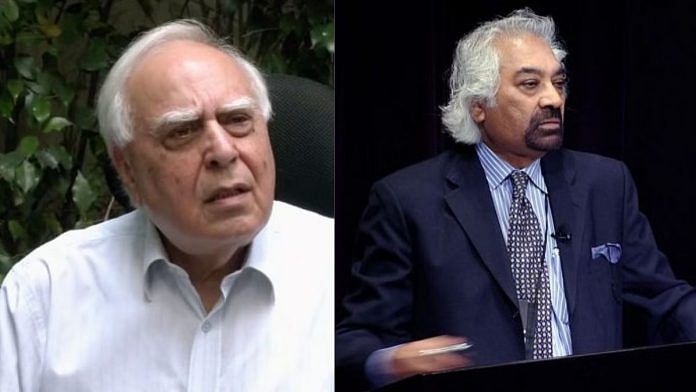New Delhi: Sam Pitroda has an answer to what he describes as the precarity of democracy and the devolution into autocracy. An online discussion around his new book, The Idea of Democracy, provided the audience with a slew of problems, a litany of causes, and a single solution: grab the bull by its horns, and exercise your vote.
“You have two choices. Either you continue to support them and make them more powerful. Or, you throw them out,” said Pitroda in conversation with veteran lawyer and Rajya Sabha member Kapil Sibal on 6 April.
He made it crystal-clear that none of these issues are India-specific, and are part of a tidal wave engulfing countries around the world. This year marks a first in history, with at least 64 countries going to polls. There are commonalities between the world’s oldest democracy and the world’s largest. It’s the age of globalisation.
“When we liberalise the economies of the world, through that process, you have both the movement of capital across countries and also the movement of manpower,” Sibal said, going on to highlight the failures of capitalism. The rich get richer, and the system fails to deliver to the poor.
The problems plaguing India, however, took centre stage. Problems that, according to Pitroda and Sibal, have been amplified under the Modi government. Sibal referred to the muzzling of the media and the judiciary as the core of the country’s current predicament. The government controls the “narrative,” he said.
“The source of information is polluted. It’s coming from the top. They control every aspect of our lives. It’s people versus Modi, not Opposition parties versus Modi,” Sibal said. “Give me one example of what he doesn’t control.”
It was a rhetorical question, but Pitroda answered, “You and me”.
Broader conversations
The discussion centred around ideas of reclamation and dramatic change. Closely connected to this is the idea of ‘speaking out’.
“Should Muslims be speaking out? Given the issues India is currently facing, with the prejudice that they face and the plummeting sense of secularism. If Muslims do speak, they are targeted immediately,” said a Muslim woman participating in the discussion.
Pitroda answered by issuing a disclaimer – it needs a broader conversation – before delving into platitudes like the importance of courage, and the shock that accompanies such extreme polarisation.
“How could you isolate 200 million Muslims? They are part and parcel of my life. I don’t understand it. The same with Buddhists, Jews, Christians,” he said.
But Sibal was more scathing, putting the onus on the middle class while lambasting their silence. There’s a tendency to focus on Muslims and question why they don’t speak out, given the aggression and atrocities they face, he said.
“Why do we talk only about Muslims? Why doesn’t the middle class of this country speak up? The stakes are lower, and the culpability higher…What is the middle class afraid of? They are more to blame. If anyone has really failed us, it’s the educated,” he argued.
Also read: ‘People will rescue democracy’—Ex-law minister’s book launch discusses politics with shayari
Money, politics, power
Rahul Mukherji, head of the political science department at the South Asia Institute, Heidelberg University, was also part of the online audience. And he attributed the current state of affairs to a capitalistic economy.
“Essentially, it’s a problem of capitalism. A problem that has been dissolved in social-democratic settings. We find today that capital has become so powerful that it is not restrained by the state,” he said.
There are roots that lie in the past – it’s not as simple as the BJP being elected into power, and institutions collapsing like dominoes. “How do we look at the past critically?” he asked.
It was a question to which there was no answer. Instead, the discussion shifted further into territory from where it was difficult to return. “The nexus between money [large corporations], politics, and power.”
There were calls for a complete rehaul of the system, a democracy that is diverse, just, and inclusive. But there weren’t too many references to the kind of revolution that is needed, or how it is to be achieved.
(Edited by Zoya Bhatti)



